Research on Factors Influencing Municipal Household Solid Waste Separate Collection: Bayesian Belief Networks
Abstract
:1. Introduction
2. Literature Review
3. Data and Methodology
3.1. Study Area
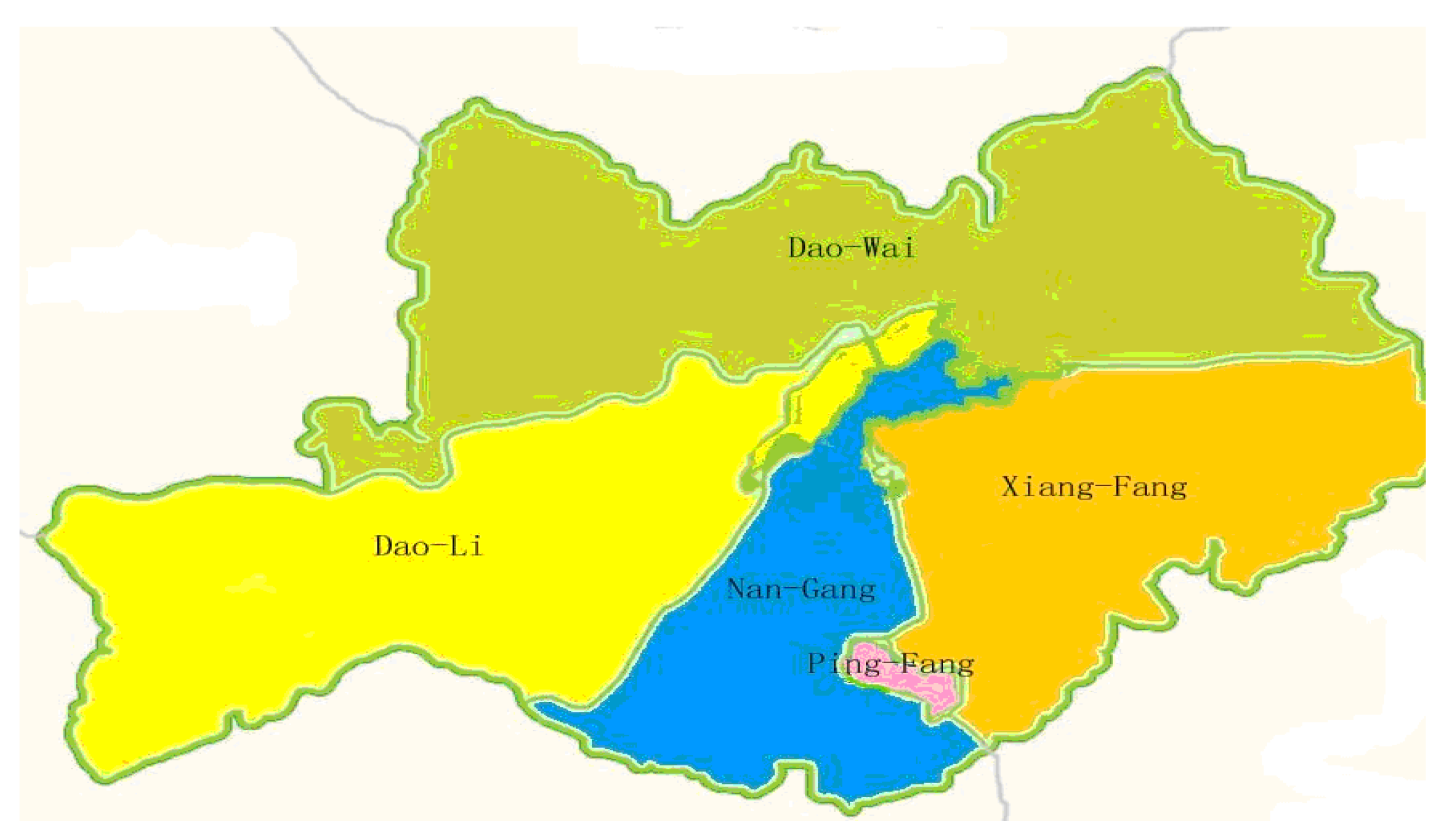
3.2. Data Collection
3.3. Influential Factors of MHSW Separate Collection
3.3.1. Political Dimension
3.3.2. Economic Dimension
3.3.3. Sociocultural Dimension
3.3.4. Technological Dimension
3.4. Bayesian Belief Networks for Influence Factors
3.4.1. Bayesian Belief Network Model
3.4.2. Structure Learning in BBNs
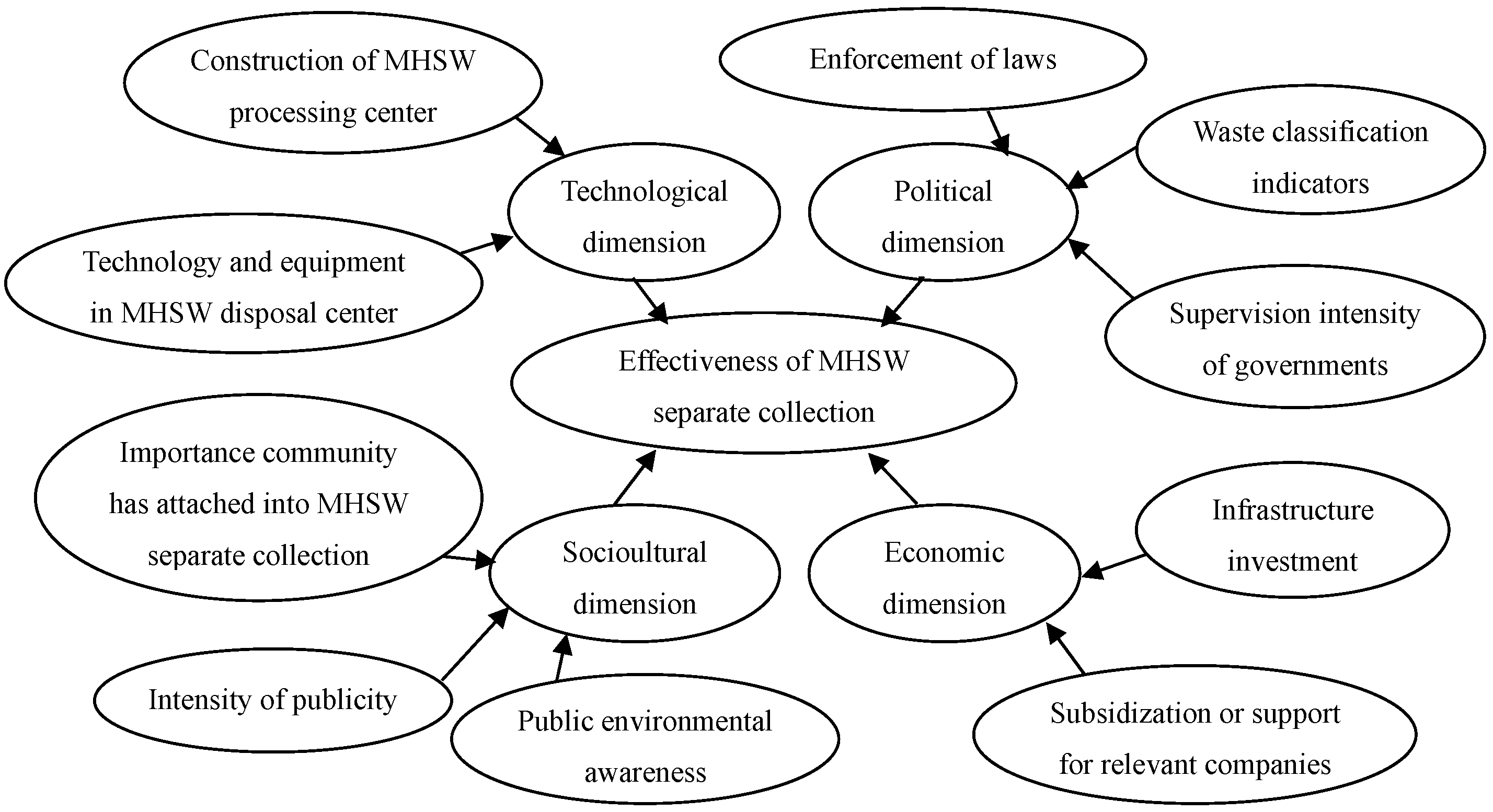
3.4.3. Parameter learning in BBNs
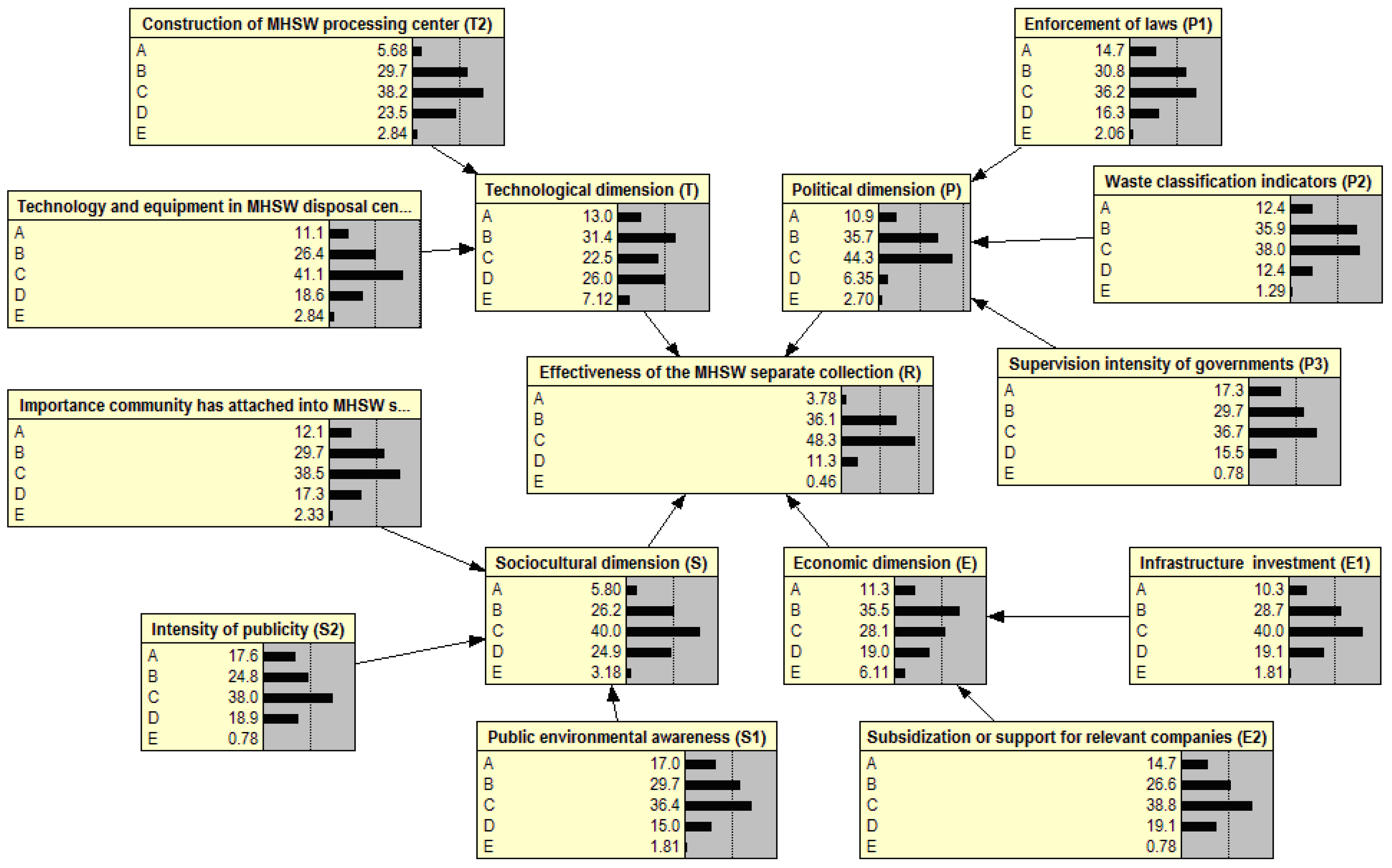
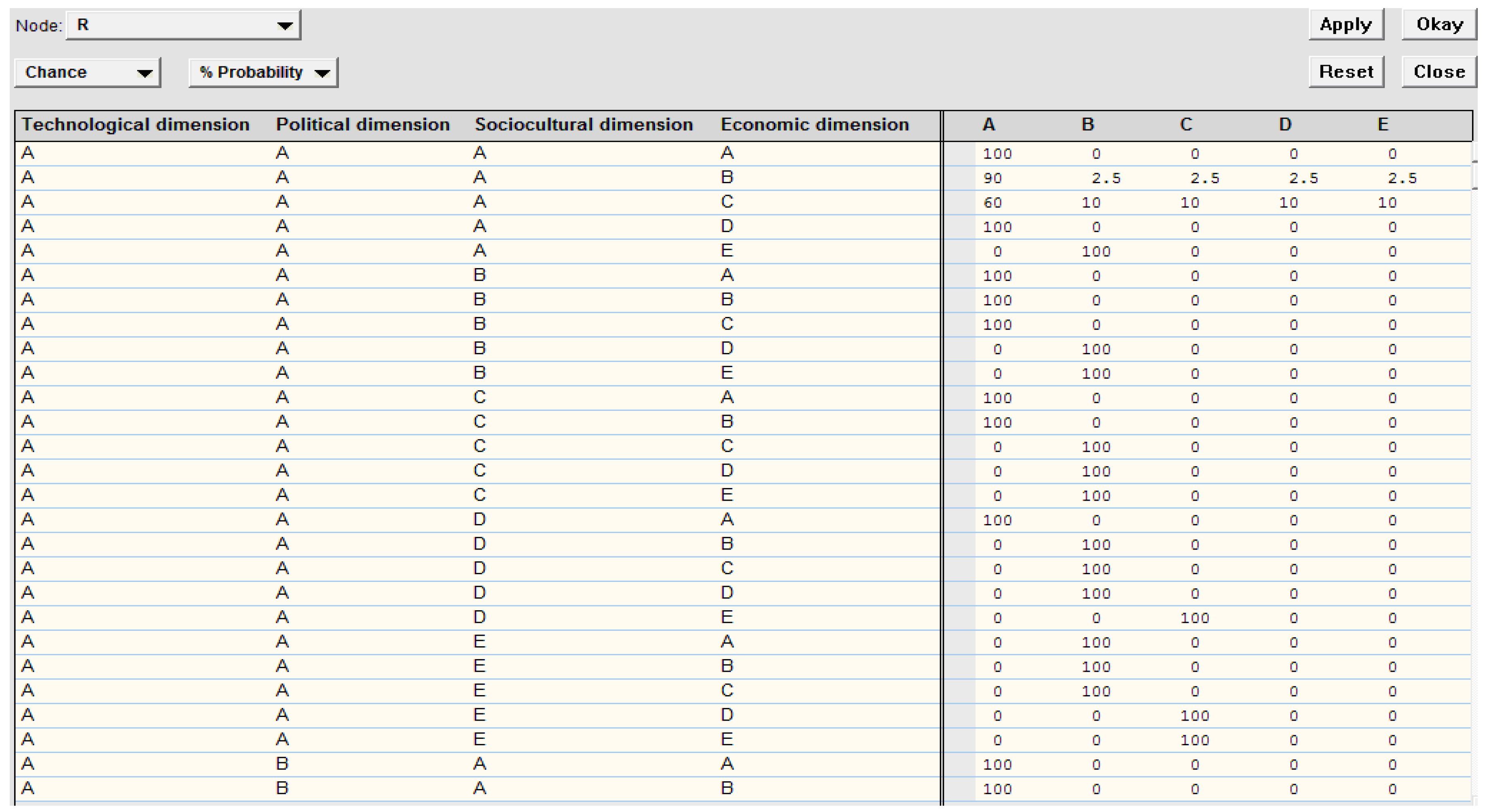
4. Results and Discussion
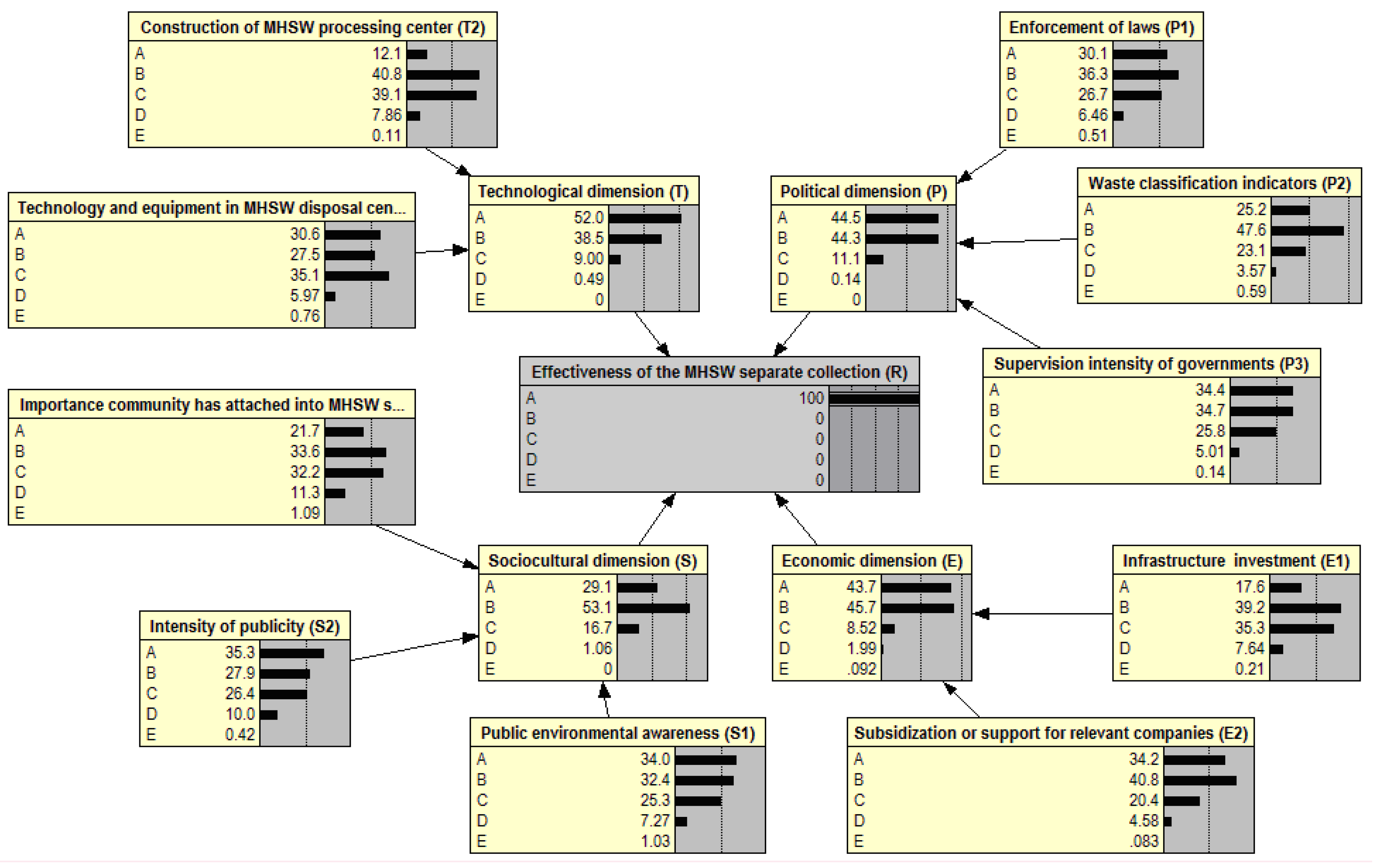
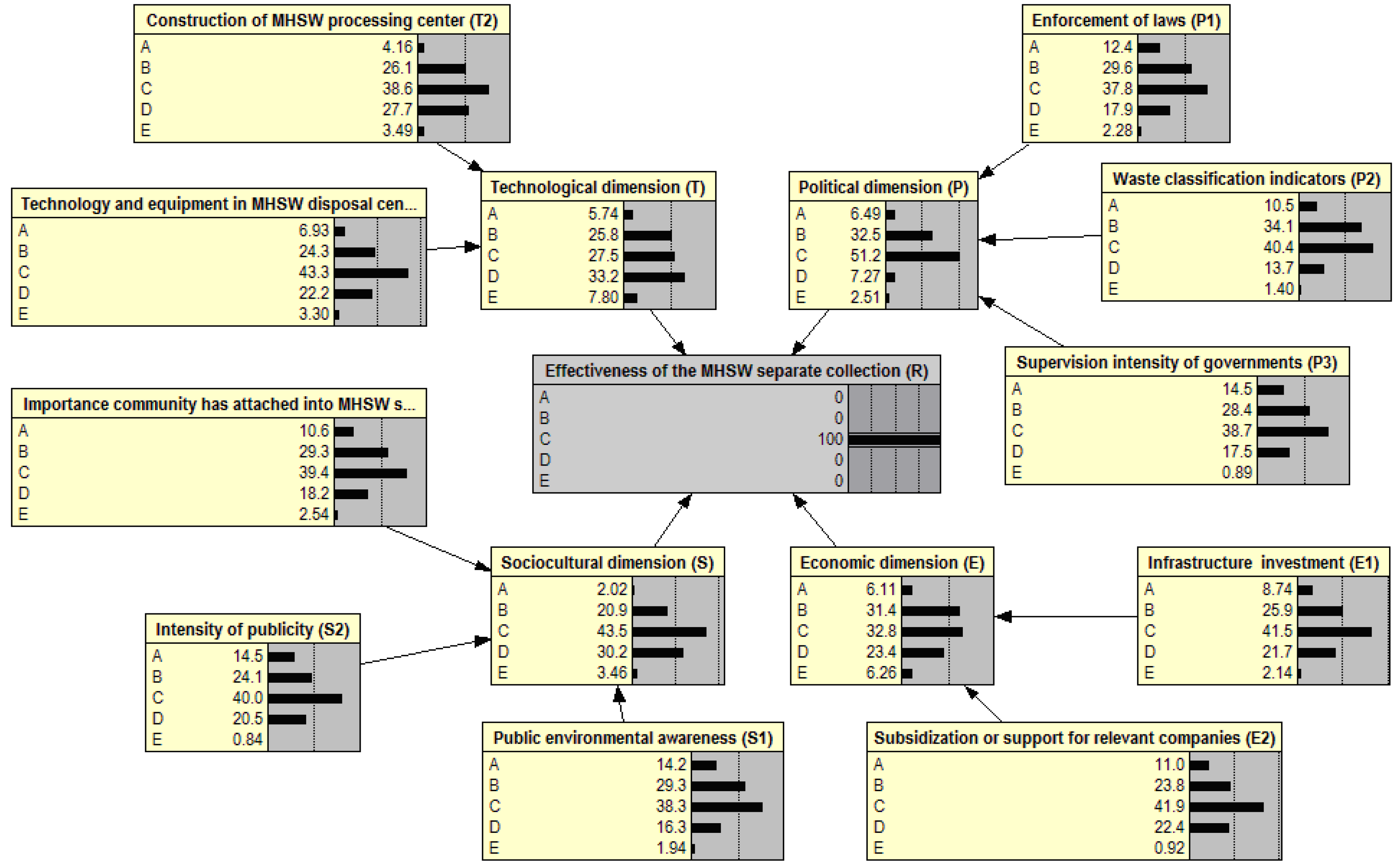

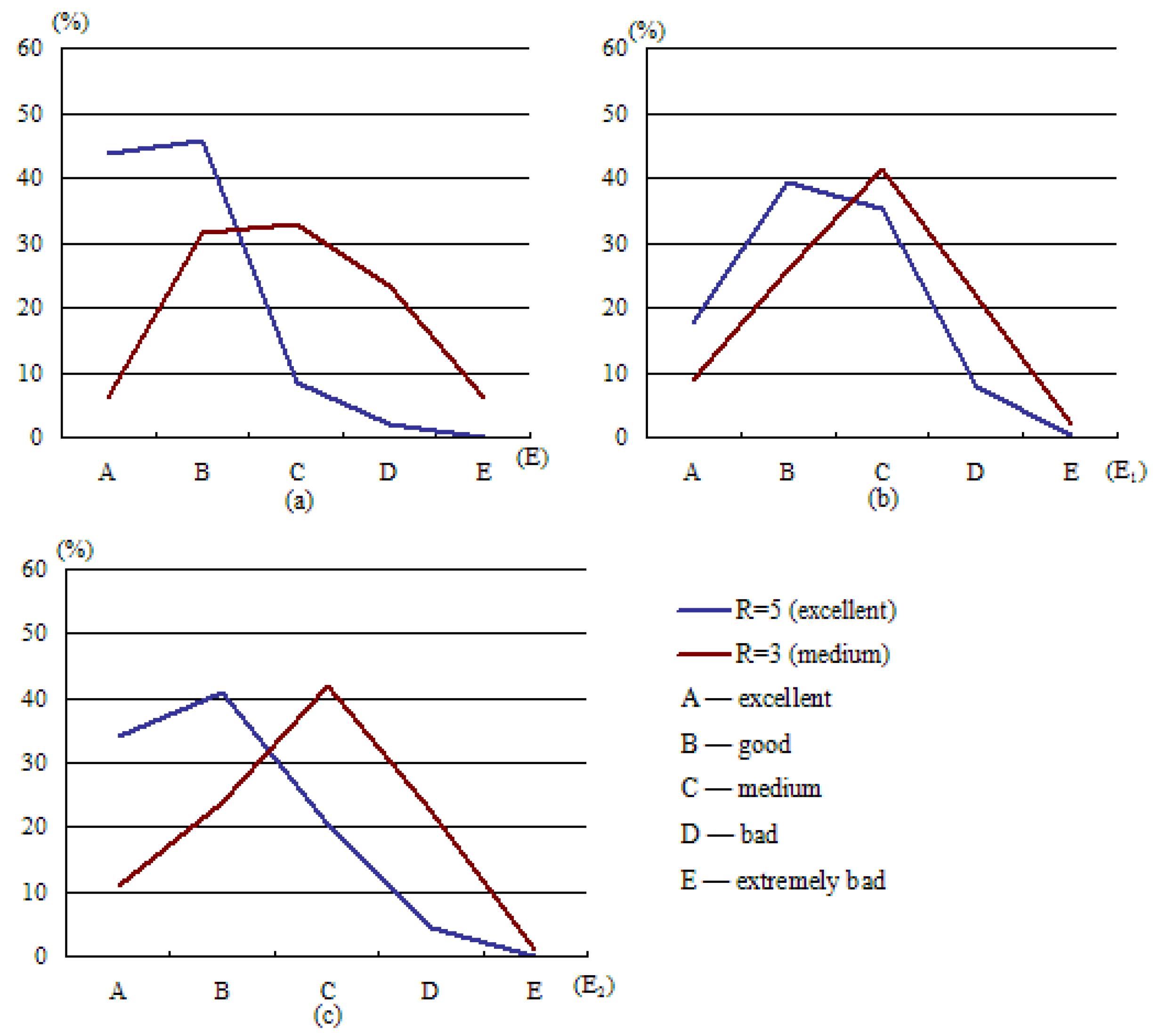
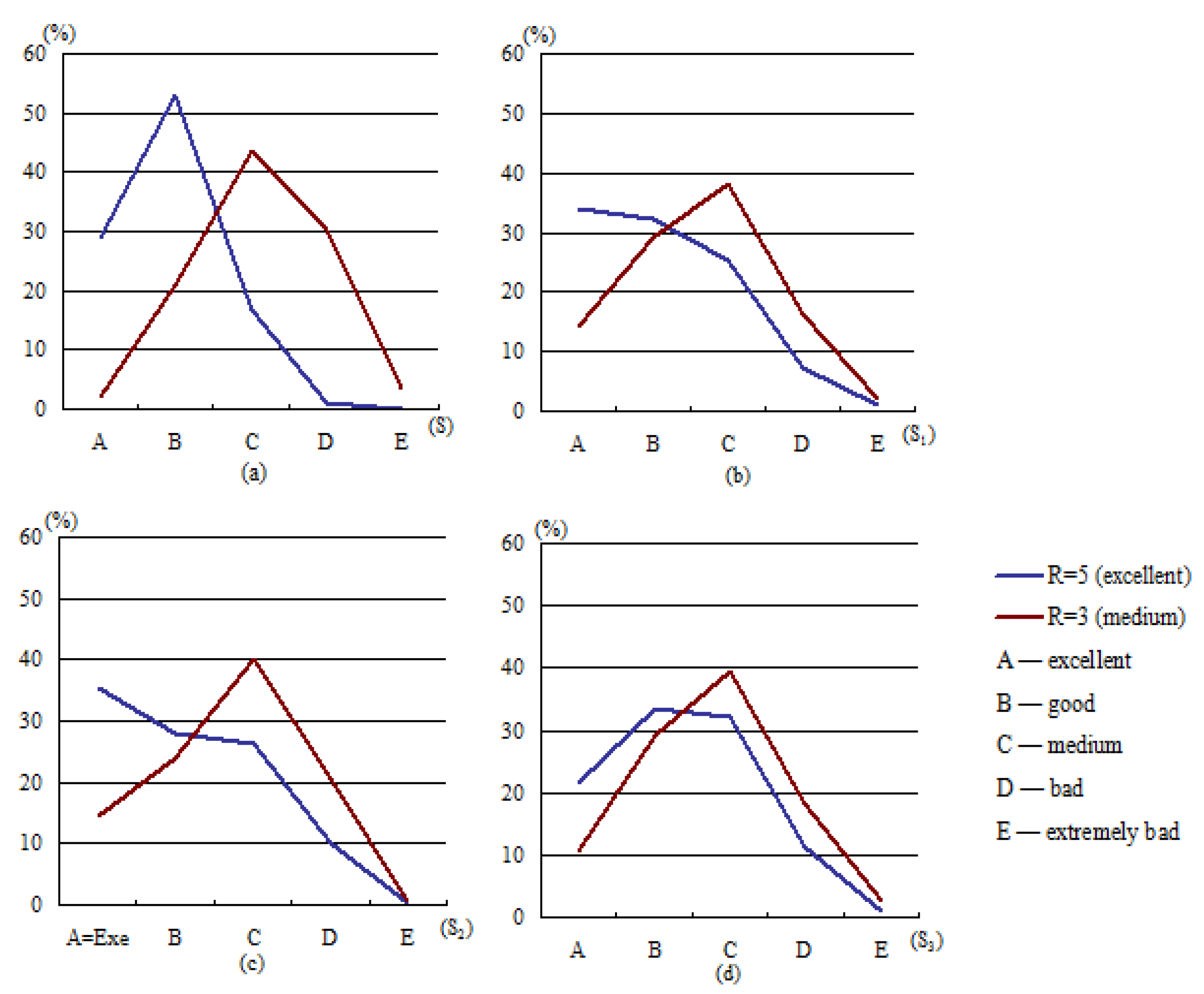
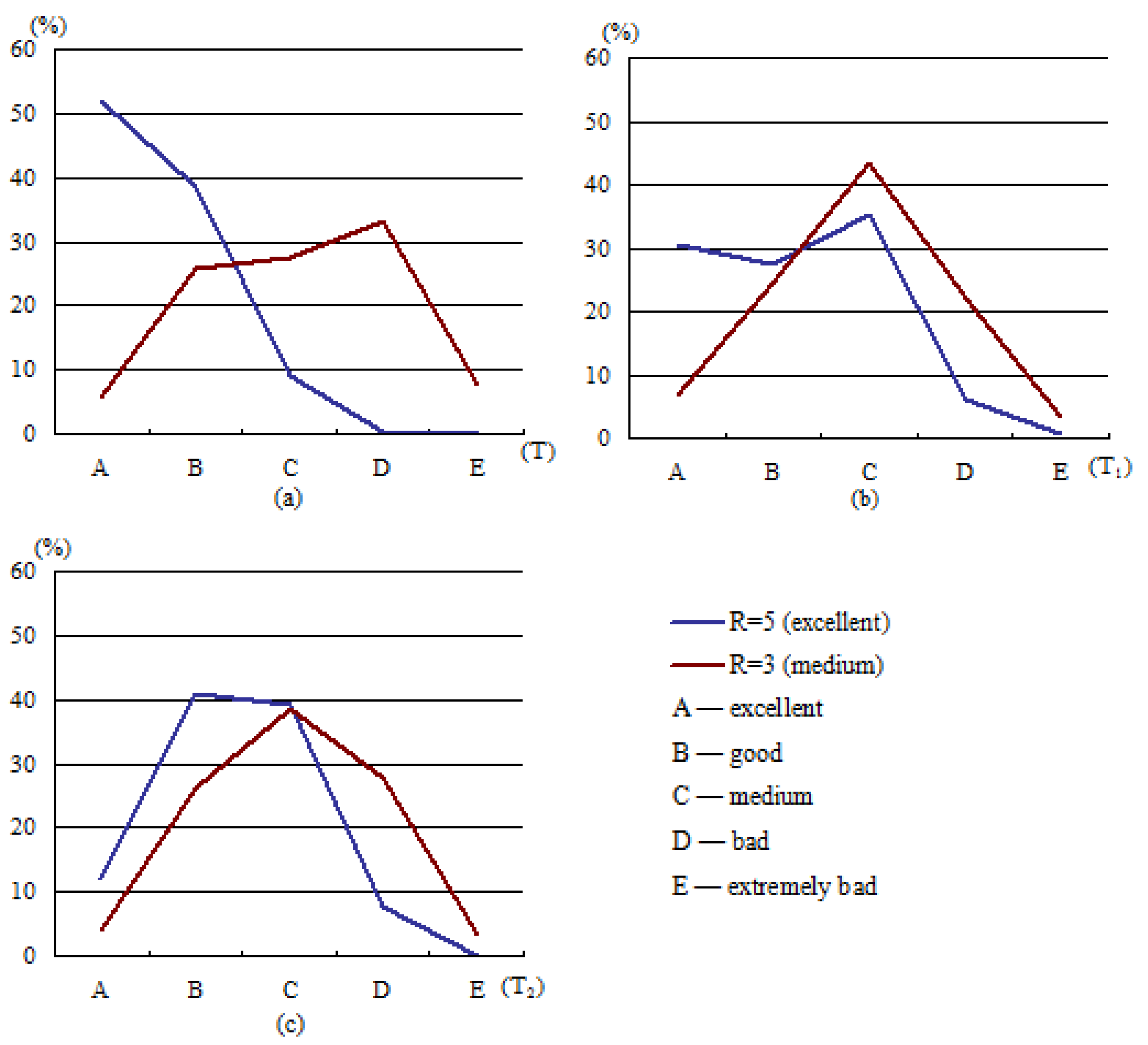
5. Conclusions
Acknowledgments
Author Contributions
Conflicts of Interest
Appendix
Questionnaire
| Please mark “√” on the dimension which you think correct. | ||||||
| Political Dimension | 1. Are you satisfied with the implementation of policies and regulations at present? | 5-strongly satisfied | 4-satisfied | 3-middle | 2-unsatisfied | 1-strongly unsatisfied |
| 2. How much do you know MHSW classification standards? | 5-most | 4-very much | 3-only some | 2-a little | 1-nothing | |
| 3. Are you satisfied with the government regulation during MHSW separate collection? | 5-strongly satisfied | 4-satisfied | 3-middle | 2-unsatisfied | 1-strongly unsatisfied | |
| Economic Dimension | 4. Are you satisfied with the investment of the infrastructure construction including MHSW collection cans and trucks? | 5-strongly satisfied | 4-satisfied | 3-middle | 2-unsatisfied | 1-strongly unsatisfied |
| 5. Do you think government is necessary to give fund support to the related enterprises? | 5-strongly necessary | 4-necessary | 3-middle | 2-unnecessary | 1-strongly unnecessary | |
| Sociocultual Dimension | 6. Do you think it is important to make MHSW separate collection? | 5-strongly important | 4-important | 3-middle | 2-unimportant | 1-strongly unimportant |
| 7. Are you satisfied with the publicity of MHSW separate collection through television, newspapers and Internet? | 5-strongly satisfied | 4-satisfied | 3-middle | 2-unsatisfied | 1-strongly unsatisfied | |
| 8. Are you satisfied with the attention to MHSW separate collection in your community? | 5-strongly satisfied | 4-satisfied | 3-middle | 2-unsatisfied | 1-strongly unsatisfied | |
| Technological Dimension | 9. Are you satisfied with the existing technology and equipment in MHSW disposal? | 5-strongly satisfied | 4-satisfied | 3-middle | 2-unsatisfied | 1-strongly unsatisfied |
| 10. Are you satisfied with the settings of MHSW disposal sites nearby? | 5-strongly satisfied | 4-satisfied | 3-middle | 2-unsatisfied | 1-strongly unsatisfied | |
| 11. Are you satisfied with the effectiveness of MHSW separate collection? | 5-strongly satisfied | 4-satisfied | 3-middle | 2-unsatisfied | 1-strongly unsatisfied | |
References
- Alam, R.; Chowdhury, M.A.I.; Hasan, G.M.J.; Karanjit, B.; Shrestha, L.R. Generation, storage, collection and transportation of municipal solid waste—A case study in the city of Kathmandu, capital of Nepal. Waste Manag. 2008, 28, 1088–1097. [Google Scholar] [CrossRef]
- Rathi, S. alternative approaches for better municipal solid waste management in Mumbai, India. Waste Manag. 2006, 26, 1192–1200. [Google Scholar] [CrossRef] [PubMed]
- Baud, I.; Grafakos, S.; Hordijk, M.; Post, J. Quality of life and alliances in solid waste management: Contributions to urban sustainable development. Cities 2001, 18, 3–12. [Google Scholar] [CrossRef]
- National Bureau of Statistics of China (NBSC). China Statistical Yearbook; China Statistics Press: Beijing, China, 2014.
- National Bureau of Statistics of China (NBSC). China Statistical Yearbook; China Statistics Press: Beijing, China, 2015.
- Schiavon, M.; Ragazzi, M.; Rada, E.C.; Merler, G. Proposal for the correct management of the life cycle assessment results from integrated municipal solid waste treatment. WIT Trans. Ecol. Environ. 2014, 180, 163–173. [Google Scholar]
- Rada, E.C. Effects of MSW selective collection on waste-to-energy strategies. WIT Trans. Ecol. Environ. 2013, 176, 215–223. [Google Scholar]
- Tanaka, M. Waste management for a sustainable society. J. Mater. Cycles Waste Manag. 2007, 9, 2–6. [Google Scholar] [CrossRef]
- Kollikkathara, N.; Feng, H.; Stern, E.A. A purview of waste management evolution: Special emphasis on USA. Waste Manag. 2009, 29, 974–985. [Google Scholar] [CrossRef] [PubMed]
- Zhang, D.Q.; Tan, S.K.; Gersberg, R.M. Municipal solid waste management in China: Status, problems and challenges. J. Environ. Manag. 2010, 91, 1623–1633. [Google Scholar] [CrossRef] [PubMed]
- Nguyen, T.T.P.; Zhu, D.J.; Le, N.P. Factors influencing waste separation intention of residential households in a developing country: evidence from Hanoi, Vietnam. Habitat Int. 2015, 48, 169–176. [Google Scholar] [CrossRef]
- Ball, R.; Lawson, S.M. Public attitudes towards glass recycling in Scotland. Waste Manag. Res. 1990, 8, 177–192. [Google Scholar] [CrossRef]
- Martin, M.; Williams, I.D.; Clark, M. Social, cultural and structural influence on household waste recycling: A case study. Resour. Conserv. Recycl. 2006, 48, 357–395. [Google Scholar] [CrossRef]
- McDonald, S.; Oates, C. Reasons for non-participation in a kerbside recycling scheme. Resour. Conserv. Recycl. 2003, 39, 369–385. [Google Scholar] [CrossRef]
- Perrin, D.; Barton, J. Issues associated with transforming household attitudes and opinions into materials recovery: A review of two kerbside recycling schemes. Resour. Conserv. Recycl. 2001, 33, 61–74. [Google Scholar] [CrossRef]
- Tonglet, M.; Phillips, P.S.; Bates, M.P. Determining the drivers for householder pro-environmental behaviour: Waste minimisation compared to recycling. Resour. Conserv. Recycl. 2004, 42, 27–48. [Google Scholar] [CrossRef]
- Bringhenti, J.R.; Günther, W.M.R. Social participation in selective collection program of municipal solid waste. Eng. Sanit. Ambient. 2011, 16, 421–430. [Google Scholar] [CrossRef]
- De Feo, G.; De Gisi, S. Domestic separation and collection of municipal solid waste: Opinion and awareness of citizens and workers. Sustainability 2010, 2, 1297–1326. [Google Scholar] [CrossRef]
- Castagna, A.; Casagranda, M.; Zeni, A.; Girelli, E.; Rada, E.C.; Ragazzi, M.; Apostol, T. 3R’s from citizens point of view and their proposal from a case-study. UPB Sci. Bull. 2013, 75, 253–264. [Google Scholar]
- Guagnano, G.A.; Stern, P.C.; Dietz, T. Influences on attitude-behavior relationships: A natural experiment with curbside recycling. Environ. Behav. 1995, 27, 699–718. [Google Scholar] [CrossRef]
- Noehammer, H.C.; Byer, P.H. Effect of design variables on participation in residential curbside recycling programs. Waste Manag. Res. 1997, 15, 407–427. [Google Scholar] [CrossRef]
- Rada, E.C.; Zatelli, C.; Mattolin, P. Municipal solid waste selective collection and tourism. WIT Trans. Ecol. Environ. 2014, 180, 187–197. [Google Scholar]
- Department of the Environment, Transport and the Regions (DETR). Less Waste More Value; Department of the Environment, Transport and the Regions: London, UK, 1998.
- Strategy Unit. Waste Not, Want Not: A Strategy for Tacking the Waste Problem in England; Strategy Unit: London, UK, 2002. [Google Scholar]
- Everett, J.W.; Peirce, J.J. Curbside recycling in the USA: Convenience and mandatory participation. Waste Manag. Res. 1993, 11, 49–61. [Google Scholar] [CrossRef]
- Ragazzi, M.; Catellani, R.; Rada, E.C.; Torretta, V.; Salazar-Valenzuela, X. Management of municipal solid waste in one of the Galapagos Islands. Sustainability 2014, 6, 9080–9095. [Google Scholar] [CrossRef]
- Glenn, J. Upfront processing at MSW composting facilities. BioCycle 1991, 32, 30–33. [Google Scholar]
- Steuteville, R. The state of garbage in America. BioCycle 1995, 4, 54–63. [Google Scholar]
- Noh, M.; Lee, Y.; Oh, S.; Chu, C.; Gwack, J.; Youn, S.K.; Cho, S.H.; Lee, W.J.; Huh, S. Spatial and temporal distribution of plasmodium vivax malaria in Korea estimated with a hierarchical generalized linear model. Osong Public Health Res. Perspect. 2012, 3, 192–198. [Google Scholar] [CrossRef] [PubMed]
- Yau, Y. Domestic waste recycling, collective action and economic incentive: The case in Hong Kong. Waste Manag. 2010, 30, 2440–2447. [Google Scholar] [CrossRef] [PubMed]
- Minton, A.P.; Rose, R.L. The effects of environmental concern on environmentally friendly consumer behavior: An exploratory study. J. Bus. Res. 1997, 40, 37–48. [Google Scholar] [CrossRef]
- Desa, A.; Kadir, N.B.A.; Yusooff, F. A study on the knowledge, attitudes, awareness status and behaviour concerning solid waste management. Procedia Soc. Behav. Sci. 2011, 18, 643–648. [Google Scholar] [CrossRef]
- Miafodzyeva, S.; Brandt, N. Recycling behaviour among householders: Synthesizing determinants via meta-analysis. Waste Biomass Valoriz. 2013, 4, 221–235. [Google Scholar] [CrossRef]
- Afroz, R.; Masud, M.M.; Akhtar, R.; Duasa, J.B. Survey and analysis of public knowledge, awareness and willingness to pay in Kuala Lumpur, Malaysia: A case study on household WEEE management. J. Clean. Prod. 2013, 52, 185–193. [Google Scholar] [CrossRef]
- Zhang, H.; Wen, Z.G. Residents’ household solid waste (HSW) source separation activity: A case study of Suzhou, China. Sustainability 2014, 6, 6446–6466. [Google Scholar] [CrossRef]
- Wellar, B.S. Information for Decision—Making by Rural Public Authorities; OECD: Williamsburg, VA, USA, 1984. [Google Scholar]
- Guerra, S. Markets for Recyclables: The Challenge for Local Government Recycling Programs; ICMA: Washington, DC, USA, 1992. [Google Scholar]
- De Feo, G.; De Gisi, S. Public opinion and awareness towards MSW and separate collection programmes: A sociological procedure for selecting areas and citizens with a low level of knowledge. Waste Manag. 2010, 30, 958–976. [Google Scholar] [CrossRef] [PubMed]
- Derksen, L.; Gartrell, J. The social context of recycling. Am. Sociol. Rev. 1993, 58, 434–442. [Google Scholar] [CrossRef]
- Timlett, R.E.; Williams, D. Public participation and recycling performance in England: A comparison of tools for behaviour change. Resour. Conserv. Recycl. 2008, 52, 622–634. [Google Scholar] [CrossRef]
- Ando, A.W.; Gosselin, A.Y. Recycling in multifamily dwellings: Does convenience matter? Econ. Inq. 2005, 43, 426–438. [Google Scholar] [CrossRef]
- Sidique, S.F.; Lupi, F.; Joshi, S.V. The effects of behavior and attitude on drop-off recycling activities. Resour. Conserv. Recycl. 2010, 54, 163–170. [Google Scholar] [CrossRef]
- Bernstad, A. Household food waste separation behavior and the importance of convenience. Waste Manag. 2014, 34, 1317–1323. [Google Scholar] [CrossRef] [PubMed]
- Darwiche, A. Modeling and Reasoning with Bayesian Networks, 1st ed.; Cambridge University Press: London, UK, 2009. [Google Scholar]
- Jensen, F.V.; Nielsen, T.D. Bayesian Networks and Decision Graphs, 2nd ed.; Springer Verlag: Heidelberg, Berlin, Germany, 2007. [Google Scholar]
- Chu, Z.J.; Xi, B.; Song, Y.; Crampton, E. Taking out the trash: Household preferences over municipal solid waste collection in Harbin, China. Habitat Int. 2013, 40, 194–200. [Google Scholar] [CrossRef]
- Harbin Municipal Bureau of Statistics of China. Harbin Statistical Yearbook; China Statistics Press: Beijing, China, 2014.
© 2016 by the authors; licensee MDPI, Basel, Switzerland. This article is an open access article distributed under the terms and conditions of the Creative Commons by Attribution (CC-BY) license (http://creativecommons.org/licenses/by/4.0/).
Share and Cite
Chu, Z.; Wang, W.; Wang, B.; Zhuang, J. Research on Factors Influencing Municipal Household Solid Waste Separate Collection: Bayesian Belief Networks. Sustainability 2016, 8, 152. https://doi.org/10.3390/su8020152
Chu Z, Wang W, Wang B, Zhuang J. Research on Factors Influencing Municipal Household Solid Waste Separate Collection: Bayesian Belief Networks. Sustainability. 2016; 8(2):152. https://doi.org/10.3390/su8020152
Chicago/Turabian StyleChu, Zhujie, Wenna Wang, Bairong Wang, and Jun Zhuang. 2016. "Research on Factors Influencing Municipal Household Solid Waste Separate Collection: Bayesian Belief Networks" Sustainability 8, no. 2: 152. https://doi.org/10.3390/su8020152
APA StyleChu, Z., Wang, W., Wang, B., & Zhuang, J. (2016). Research on Factors Influencing Municipal Household Solid Waste Separate Collection: Bayesian Belief Networks. Sustainability, 8(2), 152. https://doi.org/10.3390/su8020152






